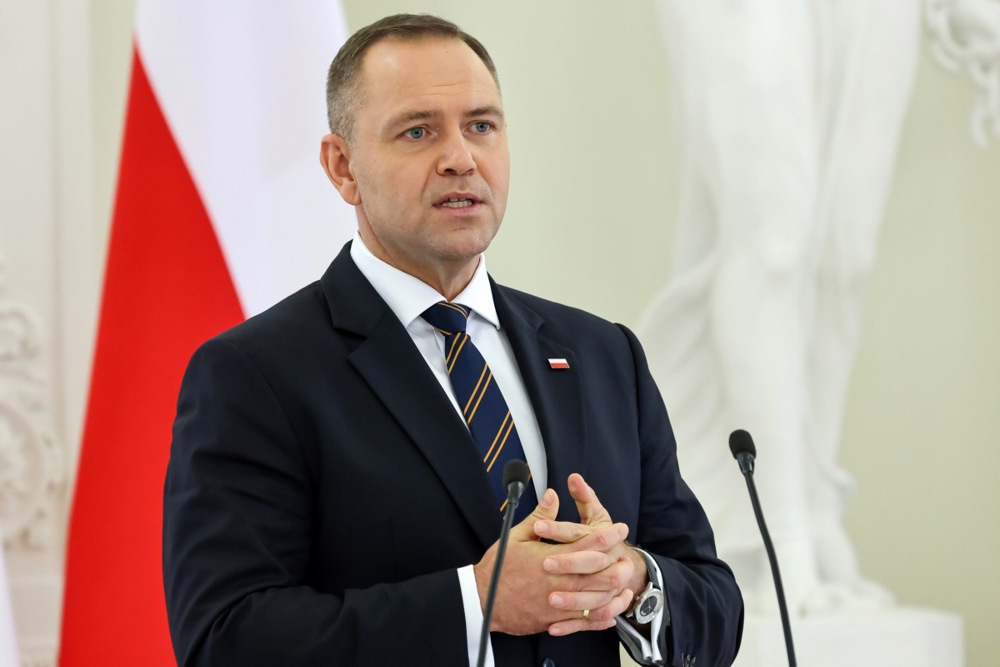Polish President Karol Nawrocki slammed the European Court of Justice (ECJ) decision to require member states to recognise same sex marriages made in other countries in the bloc.
His aides declared that Poland “will not succumb to the terror of rainbow rulings” that “completely destroy the family”.
Justice minister Waldemar Żurek, though, speaking for the centre-left Polish Government led by Prime Minister Donald Tusk, said the country will implement the ECJ ruling.
This week the ECJ ruled on a case brought by two Polish men who had married in Germany but found their efforts to have their union recognised in Poland rejected by the registry office and courts. That was because Poland’s Constitution defines marriage as being between a man and a woman.
The court deemed that infringed the freedom to move and reside within the EU as well as the right to respect for private and family life.
It ordered Poland to change its regulations on recognising such marriages conducted in other member states so that they do not discriminate against same-sex couples.
In December 2023, the European Court of Human Rights ruled that Poland’s lack of legal recognition and protection for same-sex couples violated their human rights.
Żurek told the government-controlled broadcaster TVP yesterday that Poland “will have to implement this ruling in some way” and argued that Poland’s Constitution does not prohibit same sex marriage as such.
Article 18 of the Polish Constitution states: “Marriage as a union of a man and a woman, family, motherhood and parenthood shall be placed under the protection and care of the Republic of Poland.” That has been understood by the constitutional court in the past to exclude the possibility of legalising same sex marriage.
The minister said that the issue would have to be discussed within the ruling centre-left coalition government led by Prime Minister Donald Tusk’s Civic Coalition (KO) and the Left Party and the centre-right Polish People’s Party (PSL). In the past the PSL has opposed any moves towards the recognition of same-sex unions.
Żurek, though, was positive about the ECJ ruling.
“I’m happy about this situation because it will lead to further education for our society and a lesson in tolerance,” he said, but recognised that Poland is still “a very conservative society”.
Katarzyna Kotula, the minister for equality issues who is a member of the Left Party was more fulsome in her welcome for the ECJ decision.
“This is a historic ruling that begins a completely new phase in the legal protection of same-sex couples,” she said, adding: “It clearly states that Poland is obligated to transcribe foreign marriage certificates of same-sex couples.”
Nawrocki’s reaction was markedly different. His deputy chief of staff Adam Andruszkiewicz told reporters that the ECJ ruling was an “attempt to circumvent” the Polish Constitution and “introduce social engineering”.
“There is a very high risk that this is a very dangerous precedent that will seek to impose rainbow marriages on Poles … which will completely destroy the family. We will not succumb to the terror of rainbow rulings,” said Andruszkiewicz
He held the ruling up as an example of what Nawrocki had complained about in his speech in Prague on November 24. In that, the President argued the EU, initially created as an economic union, was increasingly trying to “dictate the terms” of member states’ political and judicial systems.
Nawrocki has the power to veto legislation approved by the government’s majority in parliament, a right he has already exercised 13 times since coming to office in August of this year.
Therefore, in order to implement the ECJ decision, the government will have to find a non-legislative path to recognise foreign same-sex marriages in order to avoid the head of state’s intervention.
The present ruling coalition has for the past two years been debating the introduction of same-sex civil partnerships but those proposals are opposed by both the President and the opposition and therefore unlikely to become law in the near future.
If Poland is deemed by the ECJ to have failed to implement the ruling, it could face ongoing fines until it does so.





